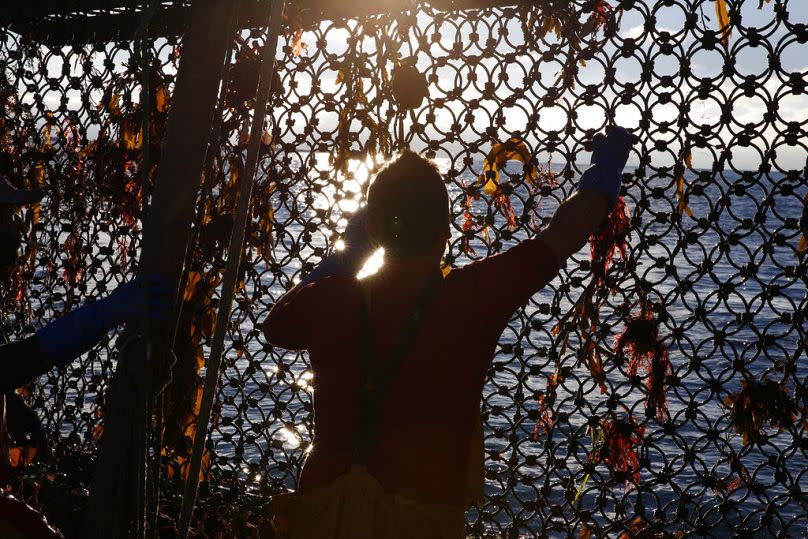A bottom trawl ban in marine protected areas would be good for everyone

Bottom trawling is rife in marine protected areas across the UK and EU. Allowing this is endangering our ocean, our climate and our coastal communities.
The damage caused by trawling and dredging in marine protected areas (MPAs) should not be underestimated.
Weighted nets scour and scar the seabed, destroying habitat — especially the refuges of young wildlife — and uprooting the foundations of ocean ecosystems.
This industrial extraction is also indiscriminate, and levels of untargeted bycatch are among the highest of any form of fishing.
Over 400 million tonnes of untargeted marine life have been discarded by bottom trawlers in the last 65 years. Everything from ancient corals to seagrass meadows, rare sharks to starfish, are at risk.
If the severity of bottom trawling is alarming, that is second only to its scale. UK offshore MPAs alone suffered over 33,000 hours of suspected bottom trawling in 2023.
What is bottom trawling? Destructive fishing practice is rife in Spain, new report finds
Italian fisherman sinks illegal trawlers with 'other-worldly' underwater sculptures
A total of 4.4 million hours of this destructive practice were allowed in MPAs across seven EU nations — Denmark, Germany, Ireland, the Netherlands, Portugal, Spain, and Sweden — between 2015-2023.
These marine havens could be the beating heart of our ocean, but not under this punishing regime.
Bounce back benefits
If the damage caused by bottom trawling should not be underestimated, neither should our ocean’s capacity for regeneration and the benefits that would bring.
Creating space for nature, properly protected MPAs would enhance marine health, diversity and resilience, boosting the foundation that all marine wildlife — and the fishing industry — depends on.
Bigger catches of bigger fish, boosted tourism revenue and jobs are just a few of the benefits to be had — as metanalysis of multiple studies published this month confirmed.
Another study showed that the total weight of fish in MPAs was on average over 100% higher than in surrounding areas.

Ocean action also means climate action. Take just one MPA as an example, off the southern tip of England it is a biodiversity hotspot, boasting cuckoo rays and rare fan mussels, but it also stores an estimated 1.67 megatonnes of carbon — equivalent to the carbon emissions of over 1 million return flights from London to Sydney.
Worldwide, the ocean stores over 3,000 billion tonnes of carbon in the top metre of sediment, much of it in national waters that are at high risk from harmful bottom trawling. Safeguarding and enhancing these vital blue carbon stores could be a valuable tool in tackling the climate crisis.
All of this adds up to a significant economic boost. In the UK alone, banning bottom trawling in MPAs could deliver benefits worth between £2.57 billion (€3bn) and £3.5bn (€4.1bn) to the economy over a 20-year period.
Greece becomes the first country in Europe to ban bottom trawling in marine protected areas
Scientists reveal how trawling the bottom of the ocean could release millions of tonnes of CO2
Any costs incurred by such a ban would also be quickly outweighed by a healthy return on investment. A study of EU MPAs showed net gains after only four years of a ban, for instance, and after 13 years there would be €3.41 returned for every €1 spent.
And we must remember that all this is in addition to a healthy ocean, teeming with awe-inspiring wildlife, safeguarded for future generations.
Let's talk about commitments
Our seas are facing a great many pressures, from the climate crisis, pollution and overfishing, and we urgently need ways to weather the storm.
Key to that is honouring the UK and EU commitment to protect 30% of our ocean by 2030, and that means MPAs can no longer be merely lines on a map, used to score cheap political points.
Bottom trawling: Are the UK government's fishing licences illegal?
To save our oceans and our planet, we need leaders ready to challenge the status quo
Marine-protected areas across the world must be properly protected and free of rampant industrialisation.
In the EU, the Marine Action Plan offered a path to put an end to this silent tragedy, but our analysis shows that most countries are ignoring EU nature laws with impunity, and continue to allow the most destructive fishing in the most sensitive waters.
The UK is also dragging its heels, and while it announced new restrictions on bottom trawling this year, these were only for rock and reef habitats and only in 13 MPAs.
This piecemeal approach — which still leaves the vast majority of the UK’s "protected" areas vulnerable to these damaging practices — is completely incompatible with allowing ocean life to recover and flourish.
This lack of commitment is a shameful betrayal of our magnificent seas and the communities they support. Properly protecting MPAs will safeguard livelihoods and wildlife, and give our ocean back its heart.
Hugo Tagholm is Executive Director of Oceana UK, and Nicolas Fournier is Campaigns Director of Oceana in Europe.
At Euronews, we believe all views matter. Contact us at view@euronews.com to send pitches or submissions and be part of the conversation.


